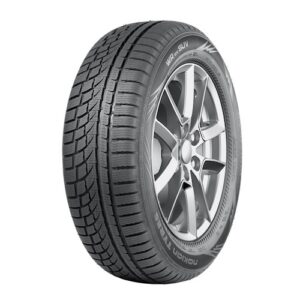When you drive your car in winter conditions, you can either choose tyres that are dedicated and are therefore designed for that specific season, or then use tyres that are hybrid between summer and winter tyres for the cold and warm season. These tyres are called all-weather tyres and can safely be used in all weather conditions. They can handle snow and ice during the winter and dry and wet roads during the spring, summer and autumn.
When you have dedicated tyres, they are better able to handle the specifics of each season better than a hybrid tyre that has to cater to both warm and cold weather. For summer tyres they can focus on making sure that the rubber compound is optimized for warm temperatures and that the tread is optimized for wet and dry road and is good at preventing aquaplaning from occurring. For the winter tyres, you can then focus solely on that the tyres should remain their flexibility and softness at low temperatures and have good grip on snow and ice, with a tread design that can incorporate metal studs for studded tyres or then cryo-crystals for the non-studded tyres. This is to make sure that they can provide sufficient grip on winter conditions for safe driving.
When you instead have all-weather tyres that have to be designed for the whole range of temperatures as well as weather conditions, you will have to sacrifice some performance to gain the convivence of having one set or tyres for the whole season. You in addition to convenience also have the safety in that you always have tyres that are safe to drive with regardless of weather conditions. It does however require that you purchase tyres that are premium of high quality that have scored good in independent tyre tests, so that they do exhibit good properties during the critical weather conditions.
When you only use one set of tyres, you have to make sure that you monitor the tread depth and rotate the tyres once you see that there is a difference of more than 2-3 mm between the front and the rear tyre. It is also worth having a tyre service station checking the tyres at the same time that they are rotated as you are not exposing the tyres to the inspection that would normally happen when switching between summer and winter tyres. The tyres should be checked for tyre pressure, tread depth and strange wear patterns.
Generally, you can conclude that it is better to have dedicated winter tyres if you have real winter conditions every year where you live. If you live in an area where the winters can occasionally come, but it doesn’t tend to hang around for too long or not be very severe, then the all-weather tyres would be an optimal choice. Both are safe to use, but with dedicated tyres you will have better performance, which will justify the need for change in severe winter conditions.
For more information regarding dedicated summer and winter tyres, visit: https://www.nokiantyres.com/
